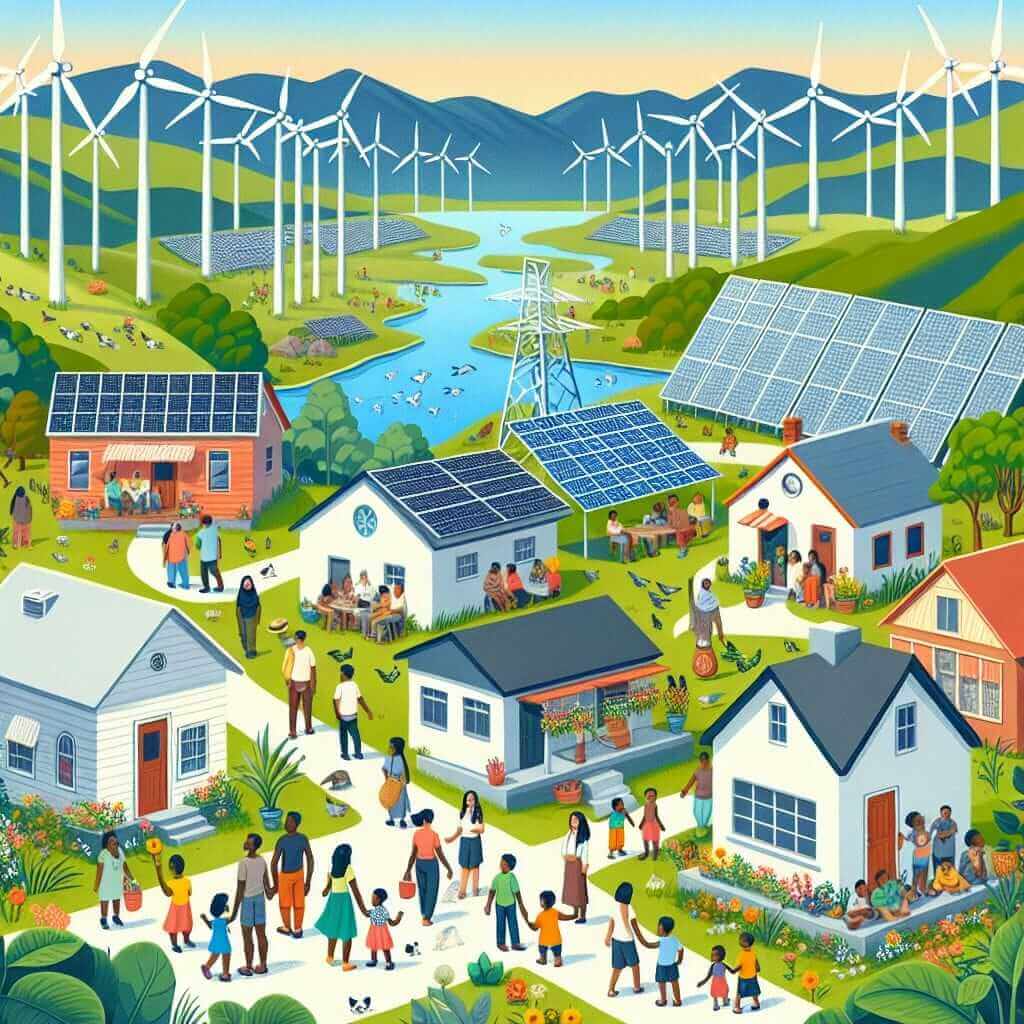The IELTS Reading section is designed to test a wide range of reading skills, including reading for gist, reading for main ideas, reading for detail, skimming, understanding logical arguments, and recognizing writers’ opinions, attitudes, and purpose. The topic “How is renewable energy influencing rural development?” is increasingly relevant and often appears in contemporary issues discussed in IELTS. Given the increased global focus on sustainability, this topic can be predicted to recur in future exams due to its timeliness and significance.
Full IELTS Reading Passage: How Renewable Energy Influences Rural Development
Reading Passage
Renewable energy has become a cornerstone of sustainable development, especially in rural areas. By providing clean, affordable, and locally sourced energy, it addresses some of the most pressing challenges in these regions. The influence of renewable energy on rural development is multifaceted and profound, impacting economic growth, social stability, and environmental sustainability.
One of the primary economic benefits of renewable energy in rural areas is the creation of jobs. Installation, maintenance, and operation of renewable energy facilities generate substantial employment opportunities. According to the International Renewable Energy Agency (IRENA), the renewable energy sector employed 11.5 million people globally in 2019, with a significant portion of these jobs located in rural areas. This job creation not only reduces unemployment but also encourages local skilled labor development.
In addition to job creation, renewable energy projects stimulate local economies through increased investments. Wind farms, solar panels, and bioenergy plants require significant investments, both initial and ongoing. These investments often come from various sources, including government grants, private sector funds, and international aid. As a result, the rural economies where these projects are based benefit from enhanced financial flows and infrastructure development.

Socially, renewable energy can vastly improve the quality of life in rural settings. Access to reliable energy supplies allows for better healthcare services, as medical facilities can operate more effectively with dependable electricity. Moreover, educational institutions can benefit from better lighting and electronic resources, facilitating enhanced learning environments. Access to energy also empowers local entrepreneurs, providing the necessary resources to start and maintain businesses.
Environmentally, the use of renewable energy reduces reliance on fossil fuels, cutting down greenhouse gas emissions and lessening the impact on local ecosystems. Rural areas, which are often more vulnerable to environmental changes, gain significantly from the environmental benefits of renewable energy. For instance, the reduction in fuelwood consumption helps conserve forests and reduce deforestation rates.
In conclusion, the deployment of renewable energy in rural areas brings a plethora of benefits. Economic growth, social improvements, and environmental sustainability are just a few of the positive changes facilitated by this transition. As the global community continues to prioritize sustainable development, the role of renewable energy in rural development will undoubtedly increase.
Questions
Question 1-4: Multiple Choice
-
What is one of the primary economic benefits of renewable energy in rural areas?
A. Reduced energy costs
B. Job creation
C. Improved healthcare
D. Better education -
According to the passage, what did the International Renewable Energy Agency report in 2019?
A. Renewable energy sector employed 11.5 million people globally
B. Renewable energy replaced fossil fuels entirely
C. Rural economies do not benefit from renewable energy
D. There was no significant investment in renewable energy -
How does renewable energy influence education in rural areas?
A. By making education more expensive
B. By providing better lighting and electronic resources
C. By reducing the number of schools
D. By removing the need for skilled teachers -
What environmental benefit is associated with renewable energy in rural areas according to the passage?
A. Increased use of fossil fuels
B. Greater deforestation
C. Less reliance on fuelwood
D. Higher greenhouse gas emissions
Question 5-8: True/False/Not Given
5. Renewable energy projects never require investments from international aid.
6. Medical facilities in rural areas benefit from unreliable electricity supplies.
7. The reduction in fuelwood consumption helps conserve forests in rural regions.
8. Renewable energy use leads to higher unemployment in rural areas.
Answer Keys
Multiple Choice Answers
- B. Job creation
- A. Renewable energy sector employed 11.5 million people globally
- B. By providing better lighting and electronic resources
- C. Less reliance on fuelwood
True/False/Not Given Answers
5. False
6. False
7. True
8. False
Common Mistakes
- Misinterpreting keywords in the questions can lead to incorrect answers.
- Overlooking details about statistics and figures provided in the passage.
- Misunderstanding the relationship between renewable energy and various sectors like healthcare and education.
Vocabulary
- Renewable (adj): /rɪˈnuːəbl/: (of a natural resource or source of energy) not depleted when used.
- Sustainable (adj): /səˈsteɪnəbl/: able to be maintained at a certain rate or level.
- Deforestation (noun): /diˌfɔrˈeɪʃn/: the action of clearing a wide area of trees.
- Facilitate (verb): /fəˈsɪlɪˌteɪt/: make (an action or process) easy or easier.
Grammar Focus
-
Passive Voice: Often used to emphasize the action rather than the doer.
Example: “The renewable energy sector employed 11.5 million people globally.” -
Present Perfect: Used to talk about actions that happened at an unspecified time before now.
Example: “Renewable energy has become a cornerstone of sustainable development.”
Advice for High Reading Scores in IELTS
- Practice Regularly: Consistent practice with passages of varying difficulties.
- Scan for Keywords: Learn to quickly find and interpret keywords in the text.
- Improve Vocabulary: A robust vocabulary helps in better understanding and answering questions correctly.
- Focus on Instructions: Carefully read instructions for each type of question to correctly follow them.
- Time Management: Learn to allocate time efficiently to avoid rushing through sections.